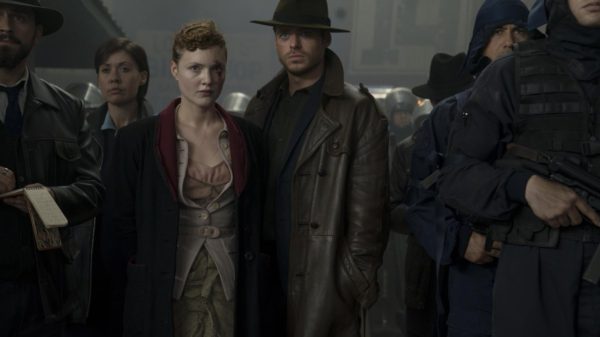If you hadn’t noticed, dystopian fiction is having a bit of a moment. In troubled times it’s human nature to seek out tales of dark futures we can only imagine or cautionary tales of how bad things can turn should we fail to take action. Philip K Dick is a master of this kind of fiction, and is one of those rare authors whose stories feel relevant no matter what time they’re told in.
But Channel 4’s new anthology series, Electric Dreams, feels particularly timely. Not only are we seeing an explosion of similar one-shot series on television (Room 104, Dimension 404, anything Ryan Murphy makes), but the themes long-relegated to science fiction are rapidly becoming much more of an everyday reality for a large portion of the world.
This first episode, The Hood Maker, deals with the very prevalent arguments around privacy, information and the right to free thought. The debate around free speech and who has the right to it dominates our era, but what if we suddenly weren’t allowed sole ownership of our secrets?
The story is told through the eyes of Honor (Holliday Grainger), a telepath forced to work with old-fashioned copper Agent Ross (Richard Madden), and the pair form a close relationship despite their differences. The tension comes from whether Ross is being truthful about his intentions, or whether he is simply manipulating Honor into revealing her own secrets.
The absence of technology in the episode should by all rights make this feel less relevant to today, but the performances and a few key lines prevent this from being the case. Honor refers to herself as ‘software’ at one early point and, for those unfamiliar with the story, it’s takes a minute to realise that she’s being sarcastic. These mind-readers are not born of technology, but of evolution.
The initial images of protests are also sadly familiar, and it’s immediately striking that we’re seeing the push-back against this would-be police state from the perspective of those who believe in the stripping of those basic freedoms.
For these characters, having access to the intentions of citizens would be a big help for solving crime and preventing an uprising, and the oppression of the ‘teeps’ allows them to use Honor for the task without as much as asking. Other teeps are forced to use their ability for – what else – the sexual gratification of men.
One particularly harrowing side-effect of this is seen in a moment when the network of teeps’ minds is forced to experience the abuse one member has been subjected to via a client’s fantasies. It’s a small taste of the community’s suffering, and it achieves a lot with a little.
A growing number of them, however, are planning to overthrow the system and take back power for themselves. The catalyst for this is the invention of hoods that block a telepath’s powers, causing them pain. The government obviously want these gone if they’re to keep a handle on the growing fear and mistrust in society and, because Honor doesn’t get a chance to tell them about the peace the hoods offer to teeps, the episode concludes with their destruction.
These masks are power, the hood maker admits, and power and protection should be democratic.
In most ways, Electric Dreams delivers on its promise. It’s thought-provoking, slickly made and features recognisable faces giving excellent performances. But, based on this episode alone, it fails to really further the conversation about those knotty issues it raises. It feels first and foremost like an adaptation of old ideas, and only survives on the prescience of Dick’s work.
Philip K Dick’s words have produced some of the best feature films of our time, so approaching them as what they are – short stories – means that Electric Dreams leaves us wanting more by design. Could, as has been teased with Black Mirror, we get to revisit some of these worlds in the future?
On it’s own, this feels a little rushed and unfinished to a modern viewer’s eye, but it’s possible that the other nine stories will better delve into the author’s imagination while holding up a mirror to today’s world.

